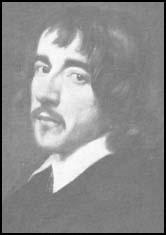Hugh Peters

Hugh Peters was born in Cornwall in 1598. Educated at Cambridge University, Peters became a Puritan and in 1626 moved to Holland and became a pastor of a church in Rotterdam.
In 1635 Peters emigrated to America and the following year he became a minister at Salem, Massachusetts. On the outbreak of the Civil War Peters returned to England and became a chaplain to the Parliamentary army. In 1650 he was appointed as chaplain to the Council of State.
On 3rd September 1658, Oliver Cromwell died. Parliament and the leaders of the army now began arguing amongst themselves about how England should be ruled. General George Monck, the officer in charge of the English army based in Scotland, decided to take action, and in 1660 he marched his army to London.
When Monck arrived he reinstated the House of Lords and the Parliament of 1640. Royalists were now in control of Parliament. Monk now contacted Charles II, who was living in Holland. Charles agreed that if he was made king he would pardon all members of the parliamentary army and would continue with the Commonwealth's policy of religious toleration. Charles also accepted that he would share power with Parliament and would not rule as an 'absolute' monarch as his father had tried to do in the 1630s.
This information was passed to Parliament and it was eventually agreed to abolish the Commonwealth and bring back the monarchy. In August 1660, Charles II and Parliament agreed to pass the Act of Indemnity and Oblivion. This resulted in the granting of a free pardon to anyone who had supported the Commonwealth government. However, the king retained the right to punish those people who had participated in the trial and execution of Charles I.
A special court was appointed and in October 1660 those Regicides who were still alive and living in Britain were brought to trial. Ten were found guilty and were sentenced to be hung, drawn and quartered. This included Hugh Peters, John Jones and Thomas Harrison.
